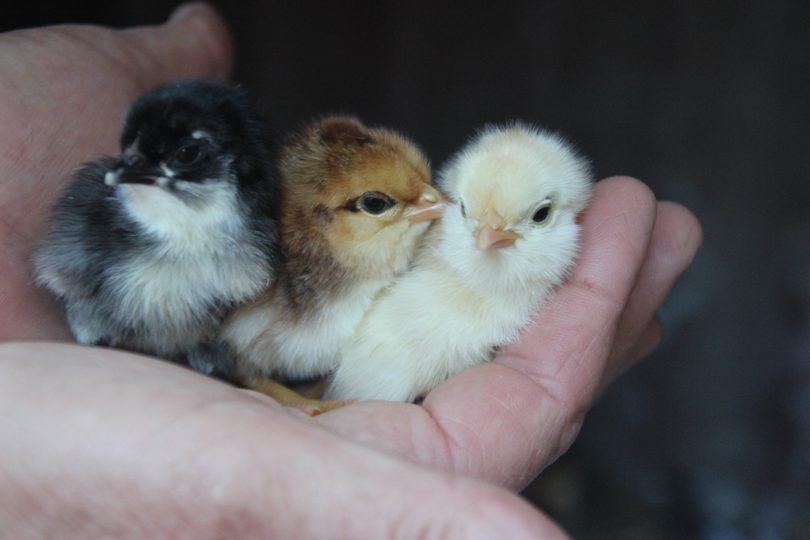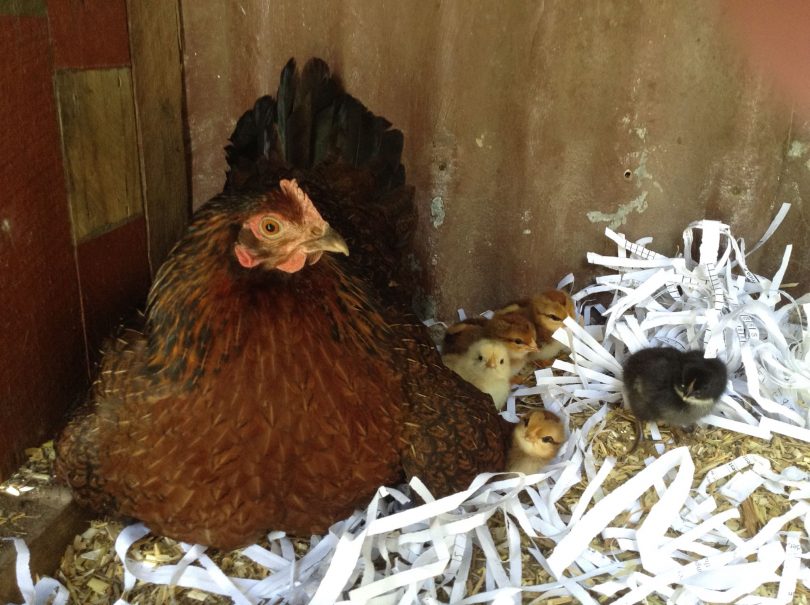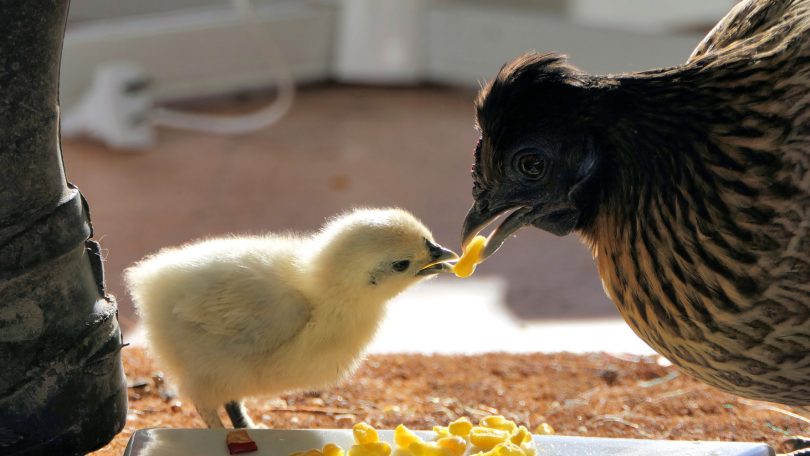
Three chicks. Photo: Cheryl Nelson.
Spring has sprung and our chooks are turning broody.
If you are raising chicks then a broody hen is nature’s best incubator.
To get started, I select six-to-12 fertile eggs depending on the size of the broody hen. Eggs can be stored up to seven days after lay, before you start incubating them, but need to be at least one day old.
If there’s a rooster in the flock the eggs will normally be fertile. If you don’t have a rooster you can buy fertile eggs online and have them posted to you!
I like to be well prepared. I have a separate predator-proof nursery coop area for the broody mum.
I put the eggs into a cosy-shaped nest in our dark, quiet nursery coop and move the broody hen onto them. This is where it can get tricky because some broody hens won’t settle into a new area, especially if they haven’t been broody for long. I usually wait until I have a few broody hens and always end up with one unable to resist such a lovely clutch of eggs.
Some breeds are more prone to broodiness – Silkies, Buff Orpingtons and Wyandottes are good broody hens.

Mum in the nest with chicks. Photo: Cheryl Nelson.
Incubation takes 21 days from setting. Make sure your broody hen eats and drinks enough. She will leave her nest briefly every day to eat, drink, poop, flap, stretch and maybe take a quick dust bath. I like to take her special chopped treats every day such as boiled egg, fermented grain, silverbeet and fruit.
Mother hen will cluck and purr softly while sitting on the eggs, which is how the chicks know her in the coop.
Towards the final hours of the hatch, you can hear them talking back to their Mumma. In this way, she gives them encouragement to break out of the shell and reassurance that they are safe.
When the eggs start hatching, Mumma is best left to her own devices. Most eggs hatch over a 24-hour period.
When she is ready she will hop off and tend to her new chicks leaving any unviable or unhatched eggs. Unhatched chicks can sometimes be helped along and nursed until they are strong enough to pop back under Mumma. I have had success with late hatching chicks by putting them in a sock on a string around my neck where it is nice and warm, and I return the sock chickie to Mumma at night time.
It’s a delight to watch a Mumma hen take her babies out foraging or to see a little chick’s head poking out from under her wing.
But be warned! Breeding your own will result in about 50 per cent male chicks. They grow and they crow! Consider the space you have, your neighbours and how you’ll deal with the excess roosters. Some people in rural areas grow the boys for the pot.
Often we find unplanned hatchings! Some cheeky chooks just take themselves off to a sheltered spot in the yard, in a corner or under a shrub, later to emerge with a gang of new chicks!
For the first six weeks, it’s good to keep the new family separate from the rest of your flock. Their mother should protect them from any bullying but keep an eye on them and make sure they are all getting on. It’s a good idea to have escape routes and safe areas so that young chicks can scamper to safety. If they are in any danger remove them and wait for them to be a bit bigger before reintroducing them.
Apart from fresh clean water chicks need specific blends of food for healthy growth and disease resistance. I recommend a chick starter crumble with a natural coccidiostat (Regano) for the first six weeks. After a week or so I introduce finely chopped hard-boiled eggs, shredded silverbeet, banana, probiotics and so forth – Mumma will select what she wants her chicks to try.

Chick and Mumma. Photo: Andrea Lightfoot.
Hours of time can be spent watching her teaching her young chicks to eat.
Once they are a month old, the chicks are able to have their first treatment of Super Mash. This will help to establish good gut health which is very important in young chicks.
If you are hatching some chicks this season you’ll love watching your hen’s motherly instincts as she clucks, pecks and scratches around showing her babies how to forage. Children love to watch the curious young chicks as they copy their Mumma and practice chookiness.
Being a backyard chicken farmer is all about marvelling over the delight of spring for these very social and caring creatures.
Cheryl Nelson is the brains and heart behind Natural Chicken Health.
Subscribe HERE to the Natural Chicken Health Monthly Newsletter Vlog and follow Natural Chicken Health on Facebook.
Original Article published by Cheryl Nelson on About Regional.












